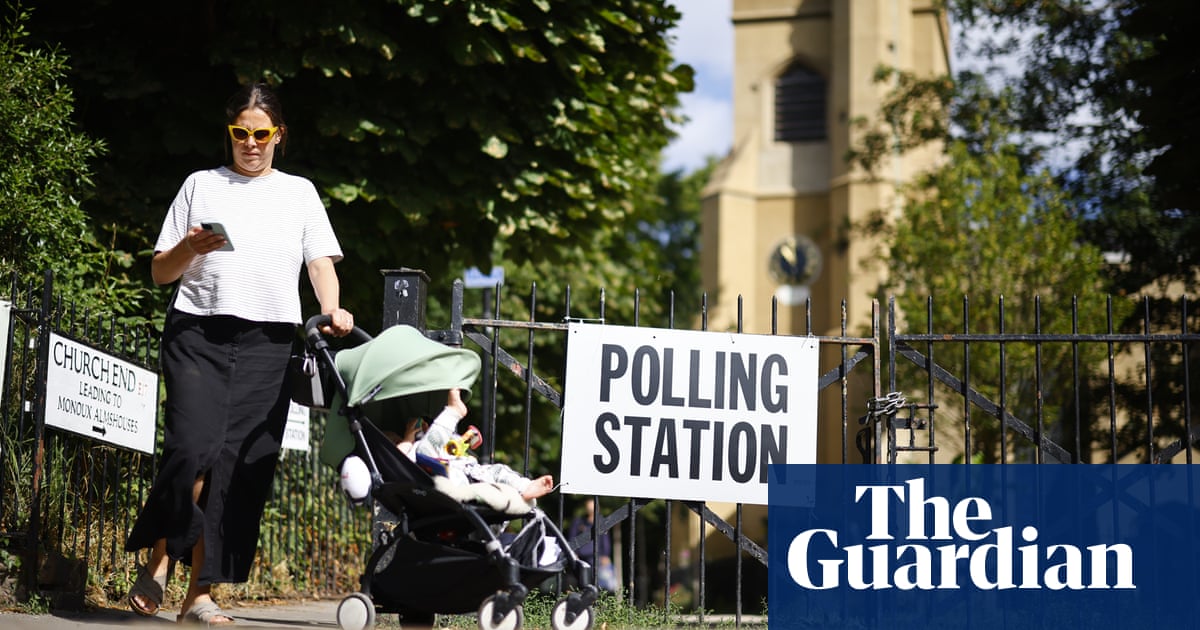
Young people feel more economically insecure, ignored and apathetic than the average voter before the election, amid evidence that they could be fuelling the growth of smaller parties.
A strong rejection of the Conservative party among the youngest voters continues to be evident: the latest Opinium poll for the Observer has a 52-point Labour lead among the under-35s.
But analysts pointed to economic pessimism and potential apathy that could also spell trouble for Labour in the years ahead. The European elections last week saw young voters help the rise of the far right in countries including France and Germany.
While analysts said there is limited evidence Reform UK has picked up substantially more younger voters in the UK – some polls in the last week had it ahead of, or on a par with, the Tories among 18- to 24-year-olds – it is the Liberal Democrats and Greens who could stand to benefit if young people ultimately feel uninspired by Keir Starmer’s pitch.
“They tend to be much more pessimistic about the economy than the population overall,” said Keiran Pedley, director of politics at Ipsos. “In 2023, younger people tended to be as pessimistic about the economy as they were during the pandemic, with young women particularly pessimistic. That has not always been the case. There’s no surprise to anybody that housing is much more of an issue for this group.”
The dynamics of an election in which the Tories are trying to shore up their core vote and Labour is going after middle England also has the potential to leave young voters out.
“On average, 43% of our respondents who have a voting intention say that there’s no chance they’re going to change their mind,” said Guy Miscampbell, head of political and social research at Focaldata. “That’s only 24% for 18- to 24-year-olds, rising to 38% for 25- to 34-year-olds.
“If you’re a young person who’s facing really high rents, tuition fees and a job market with low real-term wage growth, it’s hard to feel that there’s a party representing you … Overall, 18- to 24-year-olds are fractionally more likely to be supporting non-major parties and slightly less likely to report satisfaction when voting or [about] the idea of voting.”
If they are put off by Starmer, Pedley said that the Greens could benefit. “If you look at Green voters generally, they do tend to be younger than the population as a whole,” he said. “They also tend to be very dissatisfied with Keir Starmer, which separates them from Liberal Democrat voters, who tend to be net neutral on Starmer.”
In Luton, a town with one of the youngest populations outside areas dominated by a university, there was evidence of both anger at the Tories and a lack of enthusiasm for Labour.
Patryk Kuna recently turned 18 and is still undecided on who his vote will go to. “Labour has been making some pretty funny TikToks, so I might vote for Labour, maybe,” he said. “I just don’t like the guy [Rishi Sunak] in general. No one picked him for office so why is he there?”
Distrust of the Conservatives was echoed by 18-year-old Izzy Cowell, though she will vote Green, not Labour. “I don’t want to vote for Labour,” she said. “There’s another way to change things and not rely on a two-party system. I used to resonate with [Labour] quite a bit, but I wouldn’t say that any more. I no longer agree with their leader or what they currently stand for.” Nashe, a 23-year-old hospitality worker, voted Labour in 2019, but will not vote for the party this time. “What’s going on in Palestine and the reactions from politicians has impacted my decision to not vote for Labour again,” she said.
A 25-year-old NHS worker, who chose to remain anonymous, said she is not voting this year and has a lot of distrust towards all parties and politicians. She is one of many young people in Luton who are apathetic about the forthcoming election. “There’s a lot of young people like me who don’t give a shit because our vote doesn’t count and it’s all about what the old people think,” she said.
However, Bruno Rebelo, 24, wants to fight against the unwillingness to vote demonstrated by other young people. He said: “I think voting sometimes isn’t about making a difference but is about sending a message. It’s all about numbers, so if people in power see that change is wanted through voting numbers, then something might come out of that.”
In a sign that their attention might be elsewhere, parties have not figured out how to make use of new routes to younger voters such as TikTok, according to Dr Stephanie Luke, a researcher for the UK in a Changing Europe thinktank. “There’s different strategies with TikTok and I don’t think necessarily any political party has really got the ability to use it,” she said.
“The first post for the Tories was Rishi Sunak’s announcement on national service. Doing the same content on TikTok as Twitter [now X] is not a good strategy. It requires tailor-made content. Labour is currently top for followers, but it is not increasing substantially.”
There are attempts to engage the young. Green energy tycoon and Labour donor Dale Vince has been funding a campaign to boost turnout that claims people who vote are seen as more attractive. He said he was inspired by new voter ID rules that he feared would hit young people more: “The voter ID laws do focus on younger people and make it harder for them than it is for older people.You can use an old person’s bus pass as proof, but you can’t use a young person’s student card.”












